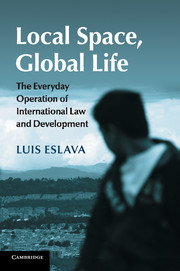Book contents
5 - The making of a new Bogotá
Published online by Cambridge University Press: 05 August 2015
Summary
In this chapter, I turn my ethnographic gaze to the changing relationship between Bogotá's local administration and the city's illegal neighbourhoods. I focus, in particular, on the new norms, discourse, techniques, mechanisms and artefacts of governance that have been developed to control illegal neighbourhoods. I also pay attention to the internal operation of the neighbourhood legalization process and its various elements. In my examination of these two primary avenues through which the local administration of Bogotá engages with the city's illegal neighbourhoods today, I show how international law and the development project are shaping both the spatiality of the city and the subjectivity of its residents – especially its most peripheral subjects – in a very particular way.
The history behind the mechanisms used to control illegal neighbourhoods and the process of their legalization is a peculiar one. Although controlling illegal urbanization and legalizing neighbourhoods have long provided the formal avenues to stop the growth of these settlements and to draw these areas into the official map of Colombian cities, both local officers and residents have typically regarded these processes as minor administrative affairs. In particular, because illegal neighbourhoods, despite their precarious and impoverished existence, are often fully involved in the economic and political life of their municipalities and have usually secured for themselves at least some level of public services and infrastructure, the act of legalizing a neighbourhood has been understood as a mere formality, with few palpable effects.
Local officers and illegal residents have also largely disregarded official attempts to control and limit the process of illegal urbanization and, conversely, that of neighbourhood legalization, being well aware of the limitations faced by local administrations both in terms of resources and political will. Officers and illegal residents are well aware of how little the condition of ‘illegality’ has deterred the expansion of informal settlements. At the same time, they also know how minimal the effects of the legalization process have been in terms of the effective transformation of illegal neighbourhoods when it comes to levels of insecurity, unemployment and poverty when compared with the rest of the city. It has been assumed by residents, therefore, that the condition of illegality is a negotiable status, and that only by exercising direct pressure and by lobbying local politicians or public service providers can they secure substantive rights for their communities.
- Type
- Chapter
- Information
- Local Space, Global LifeThe Everyday Operation of International Law and Development, pp. 174 - 236Publisher: Cambridge University PressPrint publication year: 2015



